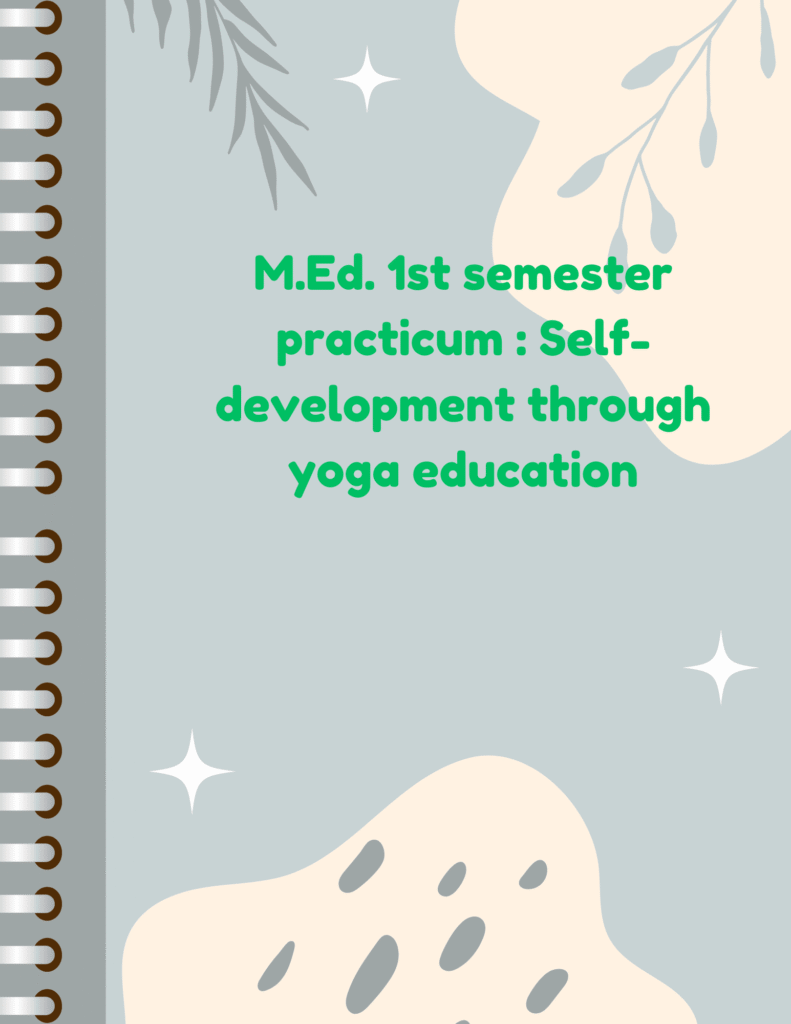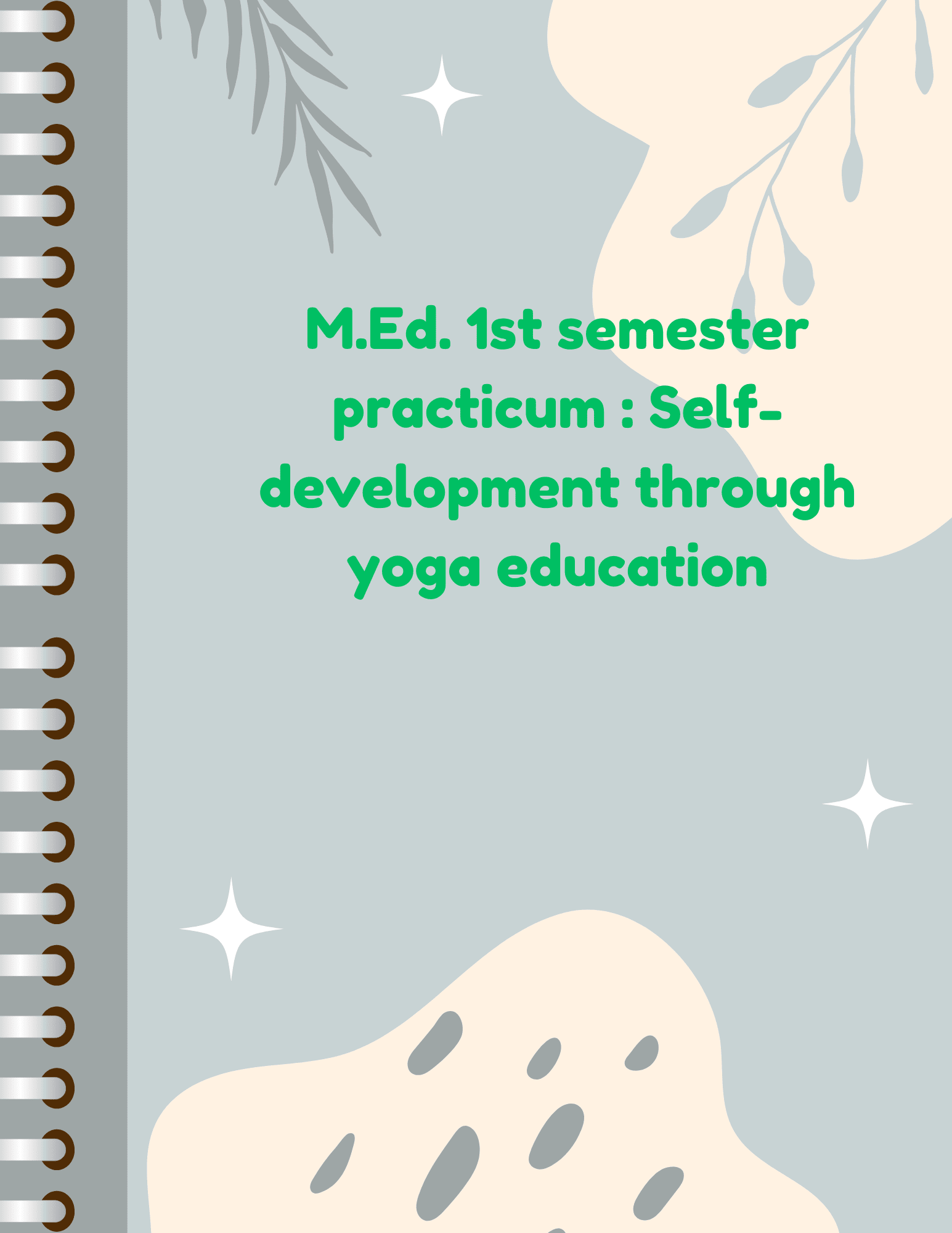
M.Ed. 1st semester practicum : Self-development through yoga education || M.Ed. 1st semester practicum : Self-development through yoga education in Bengali ||M.Ed. 1st semester practicum : Self-development through yoga education.
The Master of Education (M.Ed.) program emphasizes this dual focus, especially through its practicum component. In the first semester, one vital area is M.Ed. 1st semester practicum : Self-development through yoga education, where future educators explore how yoga can transform their personal and professional lives.
M.Ed. 1st semester practicum : Self-development through yoga education
Understanding M.Ed. 1st semester practicum : Self-development through yoga education
Yoga isn’t just about touching your toes or sitting cross-legged on a mat. It’s a comprehensive life philosophy that originated in ancient India and promotes harmony between the body, mind, and spirit. In education, yoga is becoming more than just a wellness tool—it’s a path to self-awareness and effective teaching.
The Role of M.Ed. 1st semester practicum : Self-development through yoga education
The M.Ed. 1st semester practicum : Self-development through yoga education is all about hands-on learning. It gives students a chance to apply theoretical knowledge in real settings. The 1st-semester practicum often introduces students to introspective practices like yoga to promote personal growth. This helps future teachers build the mental and emotional strength they’ll need in the classroom.
Self-Development and Its Importance
So what exactly is self-development? Simply put, it’s the process of becoming the best version of yourself—mentally, emotionally, physically, and spiritually. For educators, this is crucial. When you grow as a person, you naturally become a better guide for your students. And yoga? It’s one of the most powerful tools for this journey.
Components of Yoga Education in Practicum
Let’s break down what students typically explore in their yoga practicum:
Asanas (Physical Postures)
These improve flexibility, balance, and strength. But more importantly, they teach discipline and patience.
Pranayama (Breathing Techniques)
Breath is life. Controlled breathing calms the nervous system and sharpens focus—essential for teachers managing stressful situations.
Dhyana (Meditation)
This is the art of calming the mind. It helps students build inner peace and mental clarity.
Yamas and Niyamas (Ethical Guidelines)
These are like yoga’s moral compass, teaching honesty, self-discipline, cleanliness, and compassion—values that every teacher should embody.
Benefits of Yoga in Self-Development
Practicing yoga regularly has a ripple effect:
- Improved Physical Health: Less fatigue, fewer sick days, and a stronger immune system.
- Enhanced Mental Clarity: Better decision-making, improved concentration, and sharper memory.
- Emotional Stability: Yoga helps you manage anger, anxiety, and frustration.
- Ethical Discipline: Aligning personal values with professional ethics becomes easier.
Daily Yoga Practice for M.Ed. Students
Don’t worry—you don’t need to be a yoga guru. Start small. A simple routine might include:
- 5 minutes of breathing exercises
- 15 minutes of basic asanas
- 10 minutes of meditation
Documenting progress in a personal yoga journal helps track growth and identify patterns over time.
Case Studies and Real-Life Experiences
Take Meena, an M.Ed. student who struggled with anxiety. After just 30 days of daily yoga practice, she reported better sleep, more patience in her teaching internship, and even improved grades. Many students echo similar stories, proving the tangible benefits of yoga in real life.
Challenges in M.Ed. 1st semester practicum : Self-development through yoga education
- Lack of Awareness: Some students see yoga as irrelevant or too spiritual.
- Time Constraints: With tight academic schedules, squeezing in practice can be tough.
Solutions? Institutions should raise awareness, and teachers can guide students in short, effective routines that fit into daily life.
Role of Instructors and Institutions
A mentor can make all the difference. Instructors who are well-versed in yoga can guide correct techniques, offer encouragement, and ensure students stay consistent. Institutions should also provide time and space for regular yoga sessions.
Self-Assessment and Reflection
What’s the point of practice if you don’t reflect on it? Students are encouraged to keep a reflection journal, noting how they feel physically and emotionally. This process helps connect the dots between yoga and self-growth.
Yoga Education and Holistic Development
Yoga doesn’t just improve physical fitness. It shapes a person’s mindset, values, and outlook on life. When practiced seriously, yoga fosters:
- Empathy
- Self-awareness
- Patience
- Resilience
These traits are gold for any teacher.
Yoga and Professional Ethics in Teaching
A good teacher leads by example. Yoga helps teachers stay grounded, make ethical decisions, and interact with students from a place of empathy. It aligns perfectly with the moral responsibilities of an educator.
The Future of Yoga in Teacher Training
As stress in the education field continues to rise, yoga offers a natural, holistic solution. There’s a growing call to include yoga as a permanent part of teacher training curriculums. The results speak for themselves—it’s a game-changer.
Conclusion
Yoga isn’t just about self-care—it’s about self-transformation. For M.Ed. students, M.Ed. 1st semester practicum : Self-development through yoga education creates a strong foundation for both personal and professional growth. With regular practice, reflection, and institutional support, yoga education can help shape not just better teachers, but better humans.
Table of Contents
( 👇 DOWNLOAD LINKS 👇)
Other B.Ed files
Practicum files / Project File Free Download
| File name | File link |
| B.Ed 1st Semester Practicum Book in Bengali PDF | Click Here |
| B.Ed- 1st sem all practicum pdf | Click Here |
| B.Ed practicum semester 2 pdf in Bengali | Click Here |
| B.ed 4th semester practicum book pdf | Click Here |
| B.Ed 4th Semester Community Based Activities pdf | Click Here |
| B.Ed practicum ruprekha 2nd semester pdf download | Click Here |
| B.Ed- 4th semester practicum pdf | Click Here |
| B.Ed 4th semester practicum 1.4.11 Work and Vocational Education | Click Here |
| B.Ed 4th semester course 6 practicum pdf | Click here |
| B.Ed 4th semester practicum course VIII(B) pdf | Click Here |
| B.Ed 3rd semester basic format of learning design pdf | Click Here |
Thank You, Visit Our Educational Website Regularly for More updates https://pdfbed.com/
আপনি আপনার ব্যবহিত বি.এড বা ডি.ইএল.এড বা এম.এড-এর নোটস, অ্যাসাইনমেন্ট, প্র্যাক্টিকাম , লার্নিং ডিজাইন এবং অন্যান্য সামগ্রীর পিডিএফ আমাদের কে আমাদের “PDF BED” এডুকেশনাল অনলাইন সাইটে পাঠিয়ে সহযোগিতার হাত বাড়িয়ে দিতে পারেন। । এতে অনেক শিক্ষার্থীর উপকার হবে। বিনামুল্যে তারা এই পিডিএফ ডাউনলোড করতে পারবে । এই ব্যাপারে যোগাযোগ করতে আমাদের কে মেল করুন।
You can extend your support by sending PDF of your used B.Ed or D.L.Ed or M.Ed Notes, Assignments, Practicum, Learning Design and other materials to us at our “PDF BED” Educational Online Website. It will benefit many students. They can download this PDF for free. Email us to contact us about this
যদি আপনার আমাদের এই ওয়েবসাইটের মাধ্যমে উপকার হয়ে থাকে, তাহলে আমাদের এই প্রচেষ্টা কে আরো সাফল্য করে তুলতে আর্থিক ভাবে সাহায্য করতে পারেন।সাহায্য করতে QR code scan করে কিছু Pay করুন (যা পারবেন )। আপনাদের এই ছোটো সাহায্য অনেক students উপকারে আসবে । ধন্যবাদ।
If you have benefited from our website, then you can help us financially to make this effort more successful. To help, scan the QR code and pay something (whatever you can). This small help from you will benefit many students. thank you
QR Code:

Contact us on :
Mail: Blogbiplove98@pdfbed-com
Join Telegram Group: https://t.me/+G_nPL1W9JbY2NmM1
WhatsApp : 8001134552
